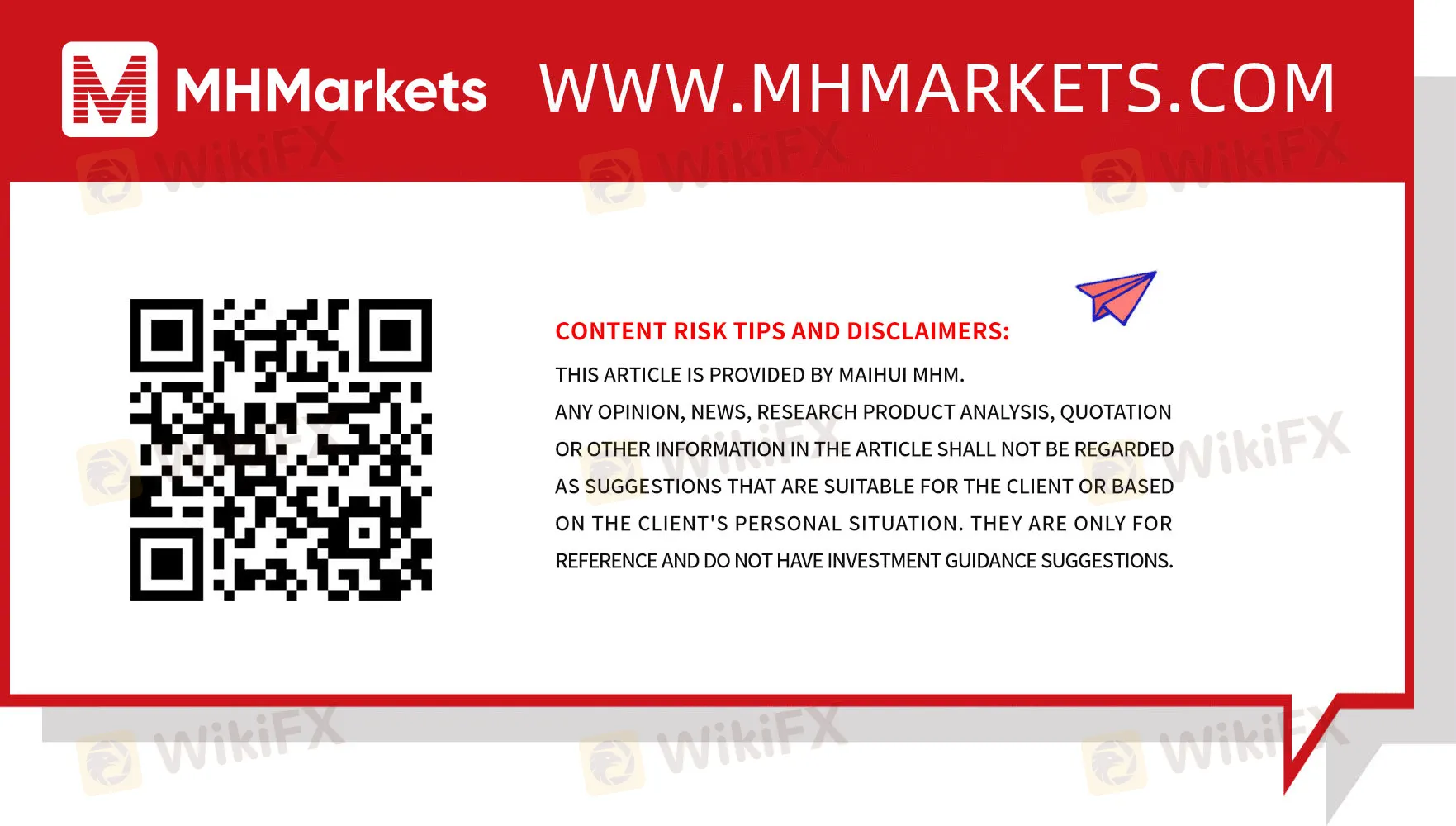MHMarkets:January 31, 2024-Fundamental Reminder
Zusammenfassung:On Tuesday, the U.S. dollar index shook lower, turned higher for a time during the session due to strong employment data, but then returned to the downtrend, and finally closed down 0.072% at 103.4; 10-year U.S. bond yields likewise in the U.S. session briefly pulled up, but continued to fall at the end of the session, refreshing the intraday lows, and ultimately closed at 4.035%; 2-year U.S. bond yields, which are more sensitive to the Fed's policy rates, barely closed up, and closed at 4.339%.

07:50 JPY BOJ Summary of Opinions (MAR)
08:30 AUD Inflation Rate YoY (Q4) & AUD Inflation Rate YoY n.s.a (DEC)
09:30 CNY NBS Manufacturing PMI (JAN)
21:15 USD ADP Employment Change (JAN)
21:30 USD Employment Cost Index QoQ (Q4)
23:30 USD EIA Crude Oil Stocks Change (JAN/26) & USD EIA Cushing Crude Oil Stocks Change (JAN/26) & USD EIA Strategic Petroleum Reserve Stocks Change (JAN/26)
Next Day 03:00 USD Fed Interest Rate Decision
Next Day 03:30 USD Fed Chairman Powell Press Conference
Market Overview
Review of Global Market Trend
On Tuesday, the U.S. dollar index shook lower, turned higher for a time during the session due to strong employment data, but then returned to the downtrend, and finally closed down 0.072% at 103.4; 10-year U.S. bond yields likewise in the U.S. session briefly pulled up, but continued to fall at the end of the session, refreshing the intraday lows, and ultimately closed at 4.035%; 2-year U.S. bond yields, which are more sensitive to the Fed's policy rates, barely closed up, and closed at 4.339%.
Spot gold, supported by a weaker dollar and U.S. Treasury yields, touched its highest level since January 16, but erased most of its gains after job openings data was released, closing up 0.19% at $2,036.78 per ounce. Spot silver ended down 0.19% at $23.16 per ounce.
International crude oil turned from losses to gains as the IMF's upward revision of its global growth forecast for this year boosted the demand outlook, with markets still waiting to see how the U.S. will respond to deadly drone strikes on its troops in the Middle East. WTI crude closed up 1.04% at $77.68 per barrel, while Brent crude closed up 0.55% at $82.86 per barrel.
The three major U.S. stock indexes were mixed, with the Dow closing up 0.34%, the Nasdaq down 0.76%, and the S&P 500 edging lower. Most chip stocks were lower, AMD.O fell more than 3%, INTC.O fell 2%, ARM.O fell 0.4%, and NVDA.O closed slightly higher, hitting another closing high. The Nasdaq China Golden Dragon Index closed down 2.2%, with NIO.N down 5, BILI.O down 4%, and BABA.N down more than 1%.
The major European stock indices closed collectively higher, with the Euro Stoxx 50 closing up 0.5%, Germany's DAX 30 closing up 0.18% and the UK's FTSE 100 closing up 0.44%.
Market Focus
1. U.S. JOLTs job openings data for December rose above expectations of 8.75 million to 9.026 million, a three-month high. The swap market reduced the probability of a Fed rate cut in March to about 40%.
3. The IMF raises its forecast for global economic growth to 3.1% in 2024, compared with 2.9% in October.
4. Saudi Aramco said the government has asked it to stop increasing its oil production capacity to 13 million barrels per day and instead maintain it at 12 million barrels per day.
5. The U.S. Department of State decided not to renew General License 44, and some energy trade sanctions against the Commission will be reintroduced.
6. The U.S. Department of Energy announced the purchase of another 3 million barrels of crude oil to replenish the SPR in June.
7. The Eurozone recorded a preliminary annualized GDP rate of 0.1% in the fourth quarter, barely avoiding recession. ECB President Lagarde: All Governing Council members agree that the next move is to cut interest rates.
8. According to the statement, Houthi commanders indicated that the organization was ready for a “long confrontation” with the U.S. and the UK. Maersk updated its assessment of the Red Sea and Gulf of Aden, stating that currently available intelligence confirms that the security risk remains at a high level.
9. Saudi Arabia is reported to have resumed defense talks with the United States, including on the historic cooperation between Saudi Arabia and Israel.
10. Palestinian Jehad says no understanding will be reached with Israel at this time.
Institutional Perspective
01
【Morgan Stanley: It is expected that the Fed will only slowly lower interest rates, and they want to ensure that inflation decreases】
Morgan Stanley's senior portfolio manager in charge of U.S. stocks said in an interview that it is expected that FOMC will only slowly lower interest rates this year and will maintain “patience”. The current strong performance of the U.S. economy has given the Fed time to remain patient and ensure that the true long-term trend of inflation declines. In addition, the inflation rate is significantly lower than the federal funds rate. He also said that if the Fed sends a message that it needs to cut interest rates faster, it will make him a bit nervous because it may mean that the pace of economic slowdown may be faster than he expected. For 2024, he predicts that it will be more challenging for the U.S. stock market to maintain an upward trend after the S&P 500 index surged in 2023, but this year the market will rise as he believes profits will emerge. He stated that he is in the camp supporting the economy to remain strong, and he has not seen any signs of economic slowdown.
02
DG Bank AG
【DG Bank AG: Even if the Eurozone economy is weak and may continue to weaken, the European Central Bank will not cut interest rates for the first time until at least summer】
Michael Holstein, Chief Economist of DG Bank AG, believes that even if the Eurozone economy is weak and may continue to weaken, the European Central Bank will not cut interest rates for the first time until at least summer. Because its primary task is price stability. Decision makers at the European Central Bank hope to make interest rate decisions after obtaining further data on wage development for 2024 in early June. The Eurozone is on the brink of recession, and if inflation does not further decline, the European Central Bank may not be able to adjust interest rates to stimulate the economy.
03
Goldman Sachs
【Goldman Sachs: The European Central Bank may lower interest rates by the end of spring, but inflation needs to further slow down】
Gurpet Gill, a global fixed income macro strategist at Goldman Sachs Asset Management, stated in a report that inflation in the entire Eurozone is slowing, but the European Central Bank needs more evidence before lowering interest rates. She said that the European Central Bank “did not claim victory in the inflation struggle”, but if inflation further slows down and geopolitical supply chain disruptions do not escalate, the European Central Bank may shift towards interest rate cuts starting from the end of spring.
The European Central Bank has recently worked together to dispel market expectations that the European Central Bank will cut interest rates as soon as March, indicating its attempt to influence financial markets at a time when wage negotiations and corporate pricing strategies become the focus at the beginning of the year.

WikiFX-Broker
Wechselkursberechnung

